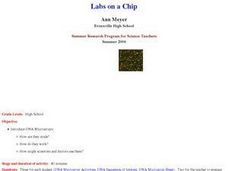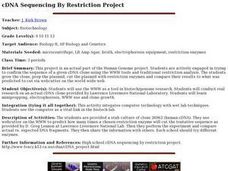Curated OER
To Smell or Not to Smell, That is the Ester
Students explain the basic concepts of polymerization. Students participate in a lab to create a crude preparation of carboxyl esterase and test its effectiveness in reducing the residual monomer in an emulsion such as paint.
Curated OER
Recombinant DNA - Electrophoresis Demonstration and Problem
Suitable for an AP Biology class, the lab found here has teen bioengineers working with plasmids to clone DNA. If you have not done a similar lab, the instructions may be rather difficult to follow. Both the teacher and learner...
Curated OER
DNA on Stick
Students experience a "hands-on" activity to get visual evidence of the physical nature of DNA and the process of DNA purification. They explore one method of chromosomal DNA isolation and DNA extraction.
Curated OER
DNA Extraction From Living Things
Students extract DNA from split peas. In this biology lesson, students hypothesize what DNA looks like and perform the experiment to verify their hypothesis. They explain the importance of DNA in living things.
Curated OER
Selecting Soil Organisms in Compost
Young scholars demonstrate that many of the enzyme systems needed to break down--and therefore clean up-society's wastes already exist in nature among the decomposers. They select the best starch-munching organisms by altering the...
Curated OER
DNA Blueprint for Life
Students isolate DNA from different food sources. In this biology instructional activity, students research DNA extraction. They analyze DNA stands collected from the lab, and compare the differences between each.
Curated OER
Pesticides and Eggshell Thinning.
Learners analyze the calcium content of egg shells as an introduction to the toxic effects of pesticides on biological systems.
Curated OER
Anatomy and Physiology "Quickies"
Students use a variety of creative writing tools within this assignment: poems on particular organ systems, write a short story and/or create a word graph. They are involved in a demonstration of lactic build up in the muscles, a...
Curated OER
Labs on A Chip
High schoolers are introduced to DNA microarrays. They discuss how scientists and doctors use them and how they work. They complete a worksheet and discuss their findings.
Serendip
Genetic Engineering Challenge – How Can Scientists Develop a Type of Rice That Could Prevent Vitamin A Deficiency?
Brown rice contains vitamins B and E, while white rice lasts longer in storage. The availability of rice around the world makes it a great candidate for genetic engineering. Scholars apply their knowledge of genetic engineering to solve...
Curated OER
Simulation of Gene Splicing
Students simulate gene splicing by examining bacteria. They create a bacterial DNA into which they insert the human DNA (gene) that codes for growth hormone. They cut the sites of the enzyme to study how the human DNA can be joined to...
Curated OER
How Genes Work Lesson Plan
High schoolers define the key terms that are the structure and function of DNA. In this genetics lesson students complete a lab activity in which they construct a model DNA structure.
Curated OER
SAY IT WITH DNA: Protein Synthesis Tutorial
Ninth graders explore protein synthesis. In this DNA instructional activity students complete a worksheet and a DNA lab activity.
Curated OER
Cracking the Code - Cloning Paper Plasmid
Students explore the "genetic code." They observe how genes may be manipulated for genetic research, gene cloning, and genetic engineering. In a lab setting, students examine the mechanics involved in cutting and ligating DNAs into a...
Curated OER
Transcription, Translation, and the Genetics of Microbes
Pupils construct various virus models using Fruit loops and Alphabits to represent nucleotides and molecules. They constructs capsomeres using shoes as the capsomeres and discuss various viruses.
Curated OER
DNA Fingerprinting: You Be the Judge!
Students use their knowledge of DNA fingerprinting to evaluate the use fingerprints in courts, and will address the ethics of establishing a national database of fingerprints.
Virginia Department of Education
Physical and Chemical Properties of Water
How can you effectively provide detailed concepts of water properties to your high school class in a way they find exciting and challenging at the same time? By letting them play, of course! Through a variety of...
Curated OER
Molecular Evolution in Plants
High schoolers are using a paper chromatography study that is suitable for introductory biology. The absorption spectra studies and gel electrophoresis studies are appropriate for students who have complete both introductory biology and...
Curated OER
cDNA Sequencing By Restriction Project
Young scholars try to confirm the sequence of a given cDNA clone using the WWW tools and traditional restriction analysis. They grow the clone, prep the plasmid, cut the plasmid with restriction enzymes and compare their results to what...
Curated OER
Selecting Soil Organisms in Compost
Young scholars conduct an experiment to demonstrate that many of the enzyme systems needed to break down society's wastes exist in nature among the decomposers in a compost pile. They culture compost bacteria on starch agar to examine...
Curated OER
Cloning of Plasmid and Spinach DNA
Students ligate fragments of genomic DNA from spinach into a vector plasmid. They perform a restriction enzyme digestion. Student use a ligated DNA molecule to transform E. coli cells. Students analyze their procedures and outcome of...
Curated OER
The Cloning of Plasmid and Spinach DNA
Students will first extract genomic DNA from spinach and perform a restriction enzyme digestion on both the spinach DNA and the plasmid using the same restriction enzyme. They then ligate the cut plasmid DNA with the cut spinach DNA in...
Curated OER
ISOLATION OF DNA FROM ONION
Students perform a lab in which they extract DNA from onion cells. Students break through the cell and nuclear membranes and then break down the protein that the DNA is wrapped around.
Curated OER
Separating a Starch-Glucose Mixture Using Gel Filtration
Students experiment using the basic principles of gel filtration. They use the gel filtration technique for testing for the presence of specific substances. Students discover that starch is a larger molecule than glucose.
Other popular searches
- Enzyme Biology Lab Pectinase
- Lysosome Enzyme Biology Lab
- Biology Enzyme Lab
- Lissome Enzyme Biology Lab
- Enzyme Biology Lab Pectin's

























